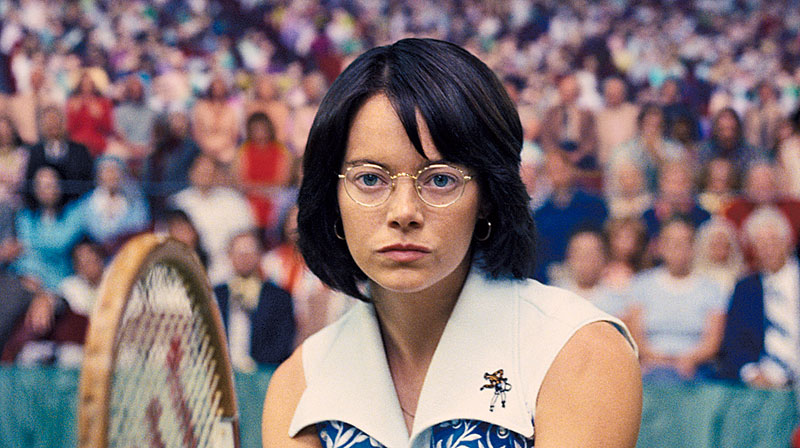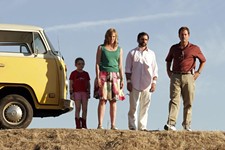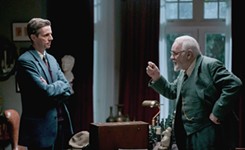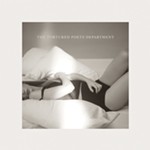
Battle of the Sexes
2017, PG-13, 121 min. Directed by Jonathan Dayton, Valerie Faris. Starring Emma Stone, Steve Carell, Andrea Riseborough, Sarah Silverman, Bill Pullman, Austin Stowell, Elisabeth Shue, Alan Cumming, Natalie Morales, Fred Armisen, Jessica McNamee.
REVIEWED By Steve Davis, Fri., Sept. 29, 2017
The highly publicized 1973 tennis match between Bobby Riggs and Billie Jean King played out as the circus sideshow of the “Me” Decade, promoted as a symbolic confrontation between Man and Woman, a clash between the Male Chauvinist and the Feminist, a duel on the center court between the Lobber and the Libber with racquets as the weapon of choice. As neatly framed by the feel-good Battle of the Sexes, much was at stake for the two participants in this hyped-up contest staged in Houston’s cavernous Astrodome, a venue aptly hearkening back to the days when Roman gladiators faced off against each other in a rounded Coliseum. For the 55-year-old loud-mouthed Riggs (Carell), a hambone hustler edging past his prime, the game served as a way to extend his professional legacy (he was a top-seeded male player and Wimbledon champ decades before) and cash in on his newfound notoriety as the world’s most piggish male, even at the risk of wounding his pride if he lost the exhibition match and its much-touted $100,000 purse.
As depicted in the film, Riggs’ misogyny is primarily all theatrics, with just a hint of the condescending belief that he would ultimately prevail over his opponent simply due to his sex. For the much younger and top-of-her-game King (Stone), the stakes were even higher, given her ongoing crusade for wage equality in the sport – she and other renegade female players broke away from the tennis establishment in the early Seventies to participate in the newly formed Virginia Slims tour that offered more palatable prize money – and the emotional upheaval of her personal life resulting from an affair with hairdresser Marilyn Barnett (Riseborough), an open secret that jostled her marriage to a devoted spouse and threatened to inflict lasting damage on her career in an era of closeted shame. Wearing a dark brown shag wig and wire-rim glasses dominating her smallish face, Stone empathetically channels King’s jumble of feelings, particularly in the scene in which the two women consummate their mutual attraction in a darkened motel room lit only by the exterior lights. When the spectacles come off, the shock of King’s naked vulnerability is the movie’s defining moment.
While sturdily constructed, Simon Beaufoy’s upbeat screenplay spells almost everything out in capital letters, with little nuance. It seldom trusts you to make your own judgments about the diverse cast of players in this chapter of pop-culture history, particularly the gentlemanly villain of the piece, tour promoter Jack Kramer (Pullman), who dismisses the notion of gender parity in sports as ridiculous. On the other hand, Shue’s lovely turn as Riggs’ estranged socialite wife, who adores the man but hates his gambling addiction, makes for a far more interesting character. Curiously, the movie sidesteps some of the story’s messier facts, like Barnett’s palimony lawsuit that painfully outed a still-married King in 1981. (The obligatory what-happened-afterward epilogue oddly leapfrogs over that episode entirely.) Still, you can’t begrudge the affirmation of self-acceptance at the film’s end, even if the message feels programmed like some LGBTQ version of a Hallmark card. Sometimes capital letters are needed to get the attention of those persons who most need to hear what needs to be said.
A note to readers: Bold and uncensored, The Austin Chronicle has been Austin’s independent news source for over 40 years, expressing the community’s political and environmental concerns and supporting its active cultural scene. Now more than ever, we need your support to continue supplying Austin with independent, free press. If real news is important to you, please consider making a donation of $5, $10 or whatever you can afford, to help keep our journalism on stands.
Marjorie Baumgarten, Aug. 3, 2012
Toddy Burton, Aug. 11, 2006
Jan. 19, 2024
Battle of the Sexes, Jonathan Dayton, Valerie Faris, Emma Stone, Steve Carell, Andrea Riseborough, Sarah Silverman, Bill Pullman, Austin Stowell, Elisabeth Shue, Alan Cumming, Natalie Morales, Fred Armisen, Jessica McNamee









